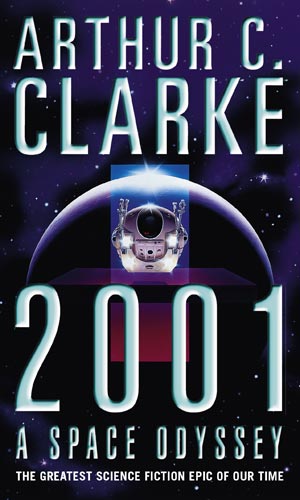
Title: 2001: A Space Odyssey
Author: Arthur C. Clarke
First Published: New American Library (1 April 1968)
Genre: Science Fiction
Where to buy: Amazon, Waterstones, Book Depository
Having seen the film of 2001 a decided to read the book to see what is essentially the same story although portrayed in a different way.
So naturally the whole book is rather overshadowed by the question "what's it like compared to the film?" Well the trouble with that question is that film and literature are tow very different mediums. Film is the visual art and books are the written art. So I would probably question "Is it better than the film?" And I would have to say...no, it is not.
Alot of people find the film incredibly confusing and annoying (I personally think it's fascinating and very interesting) and therefore they assume the book will explain things more clearly. And it would be unfair to say it doesn't go into more detail than the film, although in my opinion it goes into too much detail.
Arthur C.Clarke was a big science geek and as such tends to explain every single piece of equipment on the ship. I'm all for background detail but there's a limit to how much excitement I can have reading how the spin of the carousel of the Discovery spaceship could be stopped when necessary and that when this happened it's angular movement had to be stored in a fly-wheel and switched back again when the rotation was re-started. After pages and pages of that kind of stuff it goes get a little tedious.
But there is plot interspersed among the technobabble and there it really does hit it's stride. The scenes later in the book with HAL are wonderfully atmospheric and give you a genuine feeling of Dave Bowman's feelings and emotions when he's in a very chilling and disturbing situation.
But then that get's halted constantly for another bit of science-talk. He builds and builds and build the tension and then cuts it of to talk about how scientists have thought that the rings of Saturn are estimated to be 3 million years old. This stopping and starting jolts you and makes you feel like you are starting to get somewhere and then smacked in the face with a physics lesson.
Also, the ending didn't make much more sense in the book. Not because I didn't understand the processes going on but the way it was written was hard to follow. Was he in space? Or on a planet? Or zooming through a tunnel? And then heading to a sun but then seeing things in the sun and then buzzing over again or...something?
So in conclusion. Like Great Gatsby it's not a truly awful book but I felt long sections were very long, boring and tedious and the good bits were too far and few in-between the long essays about astro-physics.

